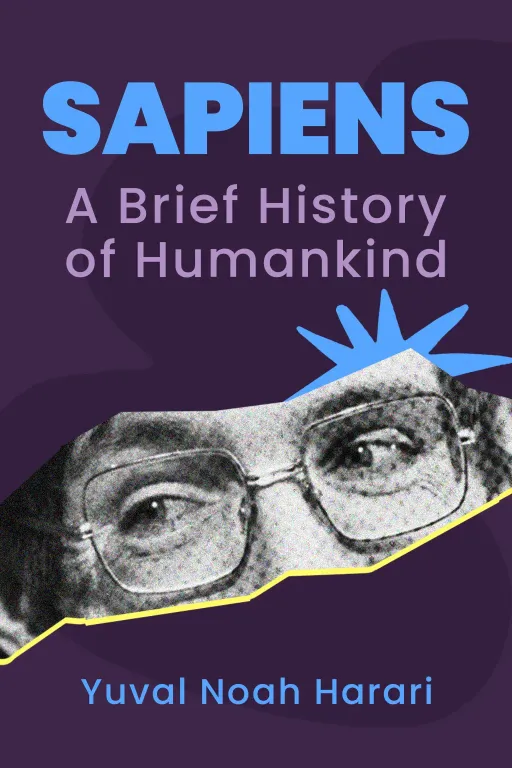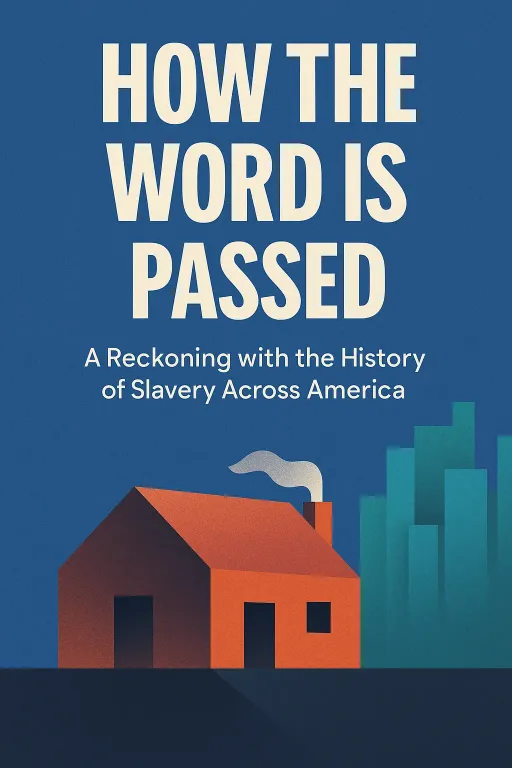
Sapiens
12 minA Brief History of Humankind
Introduction
Narrator: Imagine standing on the East African savanna two million years ago. You see familiar scenes: anxious mothers cuddling their babies, children playing in the dirt, and weary elders resting in the shade. These are our ancestors, but they are not special. They are simply one of many animal species, living and dying with no more impact on their environment than a gorilla, a firefly, or a jellyfish. There is no hint that their descendants will one day walk on the moon, split the atom, and write history books. So, how did this insignificant ape, once a mid-tier player in the food chain, become the master of the entire planet?
This is the central question explored in Yuval Noah Harari's monumental work, Sapiens: A Brief History of Humankind. The book provides a sweeping narrative of our species' journey, arguing that our rise to dominance was not inevitable but the result of a series of radical revolutions that reshaped not only the world but the very essence of what it means to be human.
From Insignificant Ape to Anxious God
Key Insight 1
Narrator: Harari begins by dismantling any notion of human exceptionalism. For most of our history, we were unremarkable. The evolution of our defining traits—an upright posture and an oversized brain—came at a steep price. Walking on two legs gave us free hands to create tools, but it also led to chronic back pain and stiff necks. Our massive brains consume over 20% of our body's energy at rest and, combined with a narrower pelvis from bipedalism, made childbirth dangerously difficult and left human infants helpless for years. As Harari notes, "It takes a tribe to raise a human."
For millions of years, humans hunted small creatures and gathered what they could, all while being hunted by larger predators. We were not at the top of the food chain. Then, in a remarkably short period, we leaped to the top. This rapid ascent had profound psychological consequences. Unlike lions or sharks, who evolved into their apex roles over eons, humans were not prepared for their new status. Harari uses a powerful analogy: Homo sapiens is like a banana republic dictator. "Having so recently been one of the underdogs of the savannah," he writes, "we are full of fears and anxieties over our position, which makes us doubly cruel and dangerous." This deep-seated anxiety helps explain why a species that now commands the planet is responsible for so much ecological devastation and endless wars.
The Secret Weapon of Fictive Language
Key Insight 2
Narrator: About 70,000 years ago, something changed. This was the Cognitive Revolution, a shift in our mental abilities that gave Homo sapiens a decisive edge over all other human species, like the Neanderthals. The secret was not a better spear or a stronger body, but a unique kind of language. While other animals could communicate "Watch out! A lion!", Sapiens became able to say, "The lion is the guardian spirit of our tribe."
This is what Harari calls "fictive language"—the ability to speak about things that do not have a physical reality, such as myths, gods, nations, and laws. This ability was a game-changer. It allowed Sapiens to cooperate in unprecedentedly large and flexible numbers. A band of Neanderthals could not function effectively beyond about 50 individuals, a group held together by intimate, personal bonds. But Sapiens could unite hundreds or even thousands of strangers around a common myth. Imagine a band of Sapiens entering a valley long inhabited by Neanderthals. The Neanderthals might be stronger individually, but the Sapiens could coordinate complex actions, share information about distant threats, and plan for the future, all because they shared a belief in a tribal spirit or a common ancestor. This ability to create and believe in shared stories—or "imagined realities"—is the foundation upon which all human civilizations, from ancient empires to modern corporations, are built.
The Agricultural Revolution as History's Biggest Fraud
Key Insight 3
Narrator: Roughly 13,000 years ago, Sapiens began to shift from hunting and gathering to farming, a transition known as the Agricultural Revolution. This is often celebrated as the dawn of progress, the moment humanity took control of its destiny. Harari presents a radically different view, calling it "history's biggest fraud." From the perspective of the individual, life became significantly worse. Farmers worked harder than foragers, had a far less varied and nutritious diet, and were more susceptible to disease and famine.
So why did we do it? Harari argues that we didn't domesticate wheat; it domesticated us. Wheat tempted Sapiens with the promise of more food per unit of territory. This led to a population explosion, but the extra food did not translate into a better life. It meant more people living in worse conditions. The farmer was tied to a small plot of land, defending it from neighbors and worrying constantly about drought or blight. The surplus food they produced fed a tiny elite of kings, priests, and soldiers, creating the first complex social hierarchies. The revolution was a massive success for the species Homo sapiens and for the plant species of wheat, but it was a disaster for the average person, who exchanged a life of relative freedom and variety for one of drudgery.
Unifying Humanity with Imagined Orders
Key Insight 4
Narrator: After the Agricultural Revolution, human societies grew larger and more complex, but they were still fragmented. Over the last few millennia, however, a powerful trend toward global unification emerged, driven by three great imagined orders that could transcend cultural and political boundaries.
The first was money. Money is the most universal system of mutual trust ever devised. As Harari points out, people who do not believe in the same god or obey the same king will happily use the same currency. A gold coin or a dollar bill has no objective value; it is valuable only because everyone believes it is valuable. This shared fiction allows for trade and cooperation on a global scale.
The second unifier was empire. Empires are political orders that rule over diverse ethnic and cultural groups. While often established through violence and oppression, they also standardized laws, languages, and cultures across vast territories, breaking down local barriers and creating a more interconnected world.
The third was universal religion. Religions like Buddhism, Christianity, and Islam were the first to claim that their laws and truths were valid for everyone, everywhere. They envisioned a universal order under a single god or a single set of principles, further eroding the divisions between "us" and "them" and laying the groundwork for a global community. Together, these three imagined orders—money, empire, and religion—drew the world together, creating what Harari calls "a single historical arena."
The Revolution of Admitted Ignorance
Key Insight 5
Narrator: For most of history, knowledge was seen as finite and complete, contained within ancient scriptures or passed down from wise elders. The Scientific Revolution, which began about 500 years ago, was built on a revolutionary idea: the "discovery of ignorance." Modern science is unique in its open admission that humanity does not know the answers to its most important questions.
This admission fueled a relentless quest for new knowledge through observation and experimentation. But science alone was not enough. Its explosive growth was made possible by its marriage to the other two great forces of the modern era: imperialism and capitalism. European empires funded expeditions to discover new lands, and these expeditions brought back not only riches but also vast amounts of new data. Capitalism, with its belief in future growth, provided the credit to fund ambitious scientific research and technological development, convinced that new discoveries would lead to new profits. This feedback loop between science, empire, and capital unleashed the unprecedented power that has defined the modern world, for better and for worse.
The Animal That Became a God
Key Insight 6
Narrator: Harari's history of our species ends with a chilling look at our present and future. For four billion years, life on Earth has been governed by natural selection. Today, Homo sapiens is on the verge of ending it. Through bioengineering, cyborg technology, and artificial intelligence, we are beginning to replace natural selection with intelligent design—our own. We are seizing control of our own evolution.
We have acquired powers that were once attributed only to gods. We can create and destroy life, reshape ecosystems, and even alter our own biology. Yet, we are still the same anxious, shortsighted apes from the savanna. We have the power of gods without the wisdom or responsibility. This leads Harari to his final, haunting question: "Is there anything more dangerous than dissatisfied and irresponsible gods who don’t know what they want?" We have become masters of the world, but we have no idea what to do with it, or with ourselves.
Conclusion
Narrator: The single most important takeaway from Sapiens is that the entire framework of modern human civilization—our nations, our laws, our economies, our values—is a massive work of collective fiction. Our ability to cooperate on a global scale is not rooted in some objective reality but in our unique capacity to believe in shared stories. We are the only species on Earth that lives in a dual reality: the objective world of rivers, trees, and lions, and the imagined world of gods, corporations, and human rights.
Harari’s work is more than a history; it is a profound reflection on our identity. It challenges us to recognize that the world we have built is fragile, held together only by the stories we tell ourselves. As we stand at a crossroads, with the godlike power to remake our world and even ourselves, the book leaves us with the ultimate challenge: having become gods, what kind of future will we choose to create?









